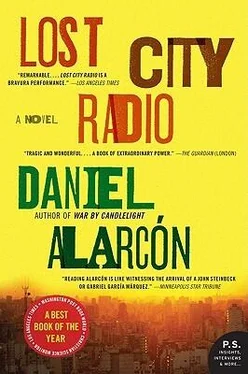“I know he is.” Elmer leaned closer. “I thought it might shake you up a bit. I saw 1797 and I thought of you. What can I say?”
“Nothing. You can’t say anything. You never can.”
“What are you talking about?”
She stopped. “I don’t know.”
He threw up his hands. “Norma, can I tell you something?” He sighed. “When I say I care about you, it’s because I do. That’s all. Now, you want to look for his family, that’s fine. Live your life.”
“Thank you.”
Then Elmer asked for the list. She had it, didn’t she? While she searched her pockets for the scrap of paper, Elmer turned back to the intercom. “Bravo,” he said. “You’re a good boy.”
In the recording room, Victor flexed his biceps.
IT WAS Rey’s own fault if she had a hard time letting go. He was into disappearing acts. Before her very eyes, a gun-wielding soldier pulls him off a bus. He resurfaces a year later; “the Moon” is all he says when she asks where they took him. And then, at the door of a second-floor apartment in a squat, green building at the western edge of downtown, Rey resurrects his own father, whom he had perversely killed off, just like that. Why? These things stayed with her, formed into solid structures in her mind: My husband can venture into a war zone and return unharmed. He can, he has, he does, he will again. The dead come back to life. He exists outside death. A strange faith to have, certainly, but was it Norma’s fault?
Rey’s father opened the door and looked his son up and down. Norma stood at one side, feeling uneasy. “Is that you?” the old man whispered. “Is it?”
“It’s me, Father,” Rey said, and the old man seemed not to believe it, seemed not to trust his eyes at all. He reached out and touched Rey’s face, the slightly crooked nose, the dimpled smile, the heavy brow. Rey pushed into his father’s touch the way a housecat might. Norma turned away, suddenly embarrassed, focusing instead on the water-stained wall.
The apartment seemed hardly big enough for one. Everywhere there were stacks of papers rising from the floor, each crowned optimistically with a palm-sized stone to hold everything in place. There were dictionaries everywhere, on the desk, on the coffee table: French-Wolof, English-Russian, Spanish-Hebrew, Quechua-Catalan, German-Portuguese, Italian-Dutch. Norma and Rey sat on the sofa, its springs poking uncomfortably through the fabric, and waited for the old man to bring water. Norma listened to the complaints of the old pipes, a gurgling, groaning sound from deep within the walls. She turned to Rey. “You’re a piece of shit,” she said.
He smiled and nodded in agreement, but she wasn’t joking. She couldn’t grasp the callousness of it: to present his father as dead, then to spring him on her like this?
The old man’s eyesight was failing, but he maneuvered expertly through the apartment. The tray hardly trembled in his hands, and he spilled no water. Rey cleared a spot on the coffee table and, after the old man had refused space on the couch and sat instead atop a pile of newspapers, they each took their mason jar of water and raised it in a toast. “To reunions,” the old man said. They were quiet for a moment, sipping the turbid tap water. Then Rey’s father coughed into his wrinkled hand. The room was dim and moldering. “Where have you been?” he said to his son. “Waiting for me to die?”
There was an odd silence between the three of them. Rey sat still, as if considering what his father had said. Norma blinked away a fly that had landed on her face.
“Well, don’t let’s start there,” the old man said, laughing, and he waved away the question, as if scattering smoke or fog, as if it had meant nothing at all. His face was yellowed and tired, his few hairs combed straight back. His bald pate was severe and pale. “Are you well, son?”
Rey nodded.
“I get by,” the old man said. “And thanks for asking. Do you see your uncle?”
“Now and again.”
It was an interview, and Norma was superfluous. The old man had barely acknowledged her, and Rey hadn’t introduced her. She sat, trying to be invisible, while father and son stared each other down, ping-ponged questions at one another: studies, health, money, distant family ties.
When they seemed to run out of topics, the old man pulled a pack of cigarettes from a drawer and offered them around. Rey took one, and then the two of them were smoking. They held their cigarettes the same way, between their second and third fingers. It looked odd. “You should quit, son,” the old man said.
“I will. You should too.”
The old man nodded. “So who is this pretty young lady?”
“This is Norma.”
The moment called for a smile; Norma did her best. The old man nodded and tipped an imaginary hat. Then he placed his hands in his lap and said, “Child, you deserve better than my derelict son.”
“Don’t fill her head with ideas,” Rey snapped.
“Has he told you?”
“Told me what?” Norma asked.
“That they took him to the Moon.” The old man eyes were gleaming. He shifted on his pile of newspapers, gave her a wry smile. “My son is a wanted man,” he said.
“That’s why I don’t visit you, Father,” Rey said, shaking his head. “You talk crazy.”
“But how long has it been since you saw each other?” Norma asked. As soon as the words were spoken, she regretted getting involved.
They both shrugged, together, as if on cue. “Not so long,” Rey’s father said. “A year. He lived here when he came back. Have you told her?” he asked again.
“Came back?”
“From the Moon,” Rey said.
“I know they took him,” Norma said. “I was there. It was two years ago.”
“You were at the Moon? How romantic: you met my boy at the Moon?”
“No, sir.”
“My son, the terrorist,” the old man muttered. “It’s what you get for talking loud in this country.”
“But I was there when they took him,” she said. Her most private memory: the bus, the vanishing. The long weeks of waiting, of falling in love with a stranger. “I—”
“We’re getting married,” Rey said, interrupting her. “Norma is my fiancée.”
Norma shot Rey a fierce glance. He pinched her leg.
“Aha!” the old man exclaimed, putting his water down. He clapped and smiled like a child presented with a new toy. “I knew there was a reason you came!”
There was hardly any air in the apartment, and barely any light. The smoke had gathered in clouds at the ceiling. Married? The old man seemed genuinely delighted, watching intently as Rey pushed the table away from the dilapidated couch. He bent down on one knee. Norma looked at Rey, at the old man, puzzled, dismayed. Then Rey was speaking, and this was exactly as she hadn’t pictured it: in a cramped apartment on the wrong side of town, in winter, in front of an old man risen from the dead. “Norma,” he was saying, “will you be my wife?” It had been two years since they’d met, and the time had passed so quickly. Rey grinned wildly, the old man clapped, and the totality of it was too strange.
“Yes,” she said, scanning back and forth between Rey and his father. It was the only answer that occurred to her. The walls looked as if they might cave in. Rey’s father was up again. “Spirits,” he called. “A drink!” Norma examined the simple silver ring Rey had just placed around her finger. “Is this just a show?” she asked. “For him?”
“It’s for us,” Rey said.
The old man came back with a bottle of clear liquor, emptied his water into a potted plant that stood wilting next to a stack of books, and beckoned Rey and Norma to do the same. He poured them both generous shots and again proposed a toast. “If only your mother was alive. Have you told Trini?” Rey’s father said. He was talking fast, very nearly running out of breath. The old man was excited. “When will you have the ceremony?”
Читать дальше












